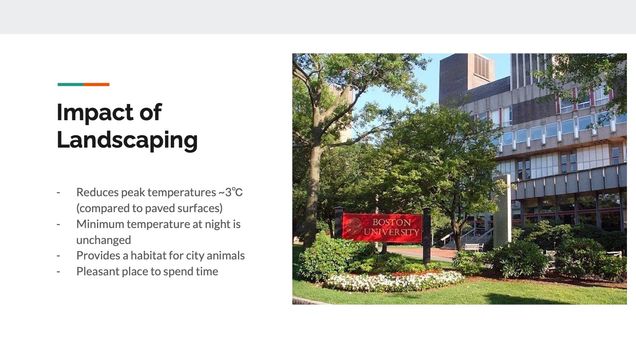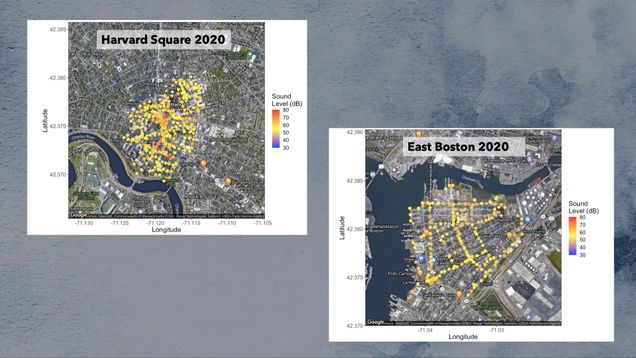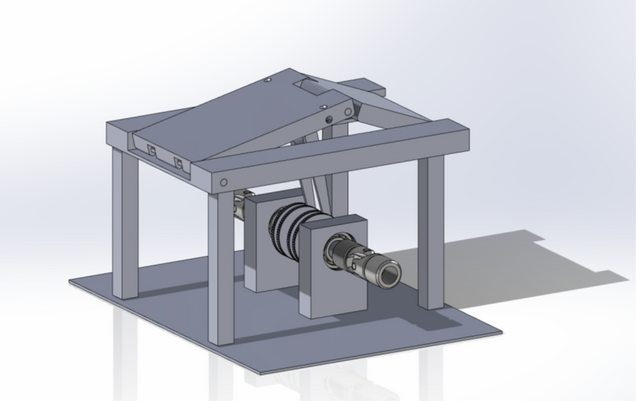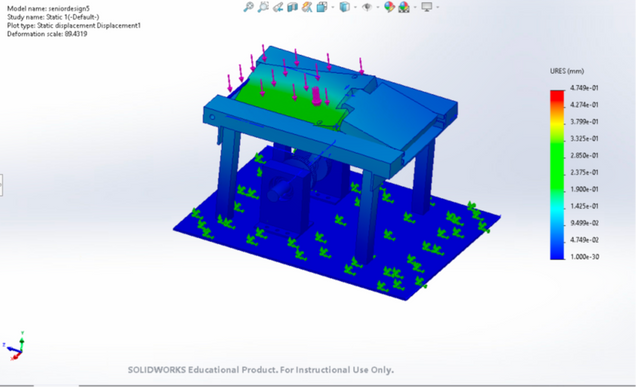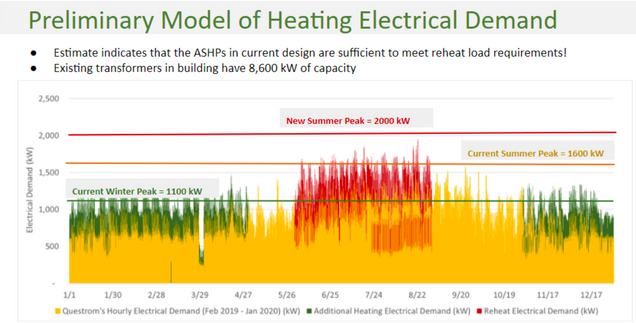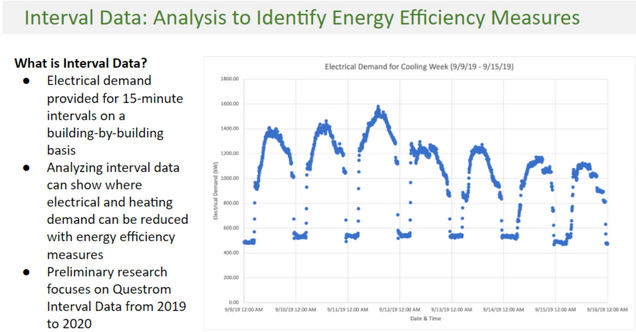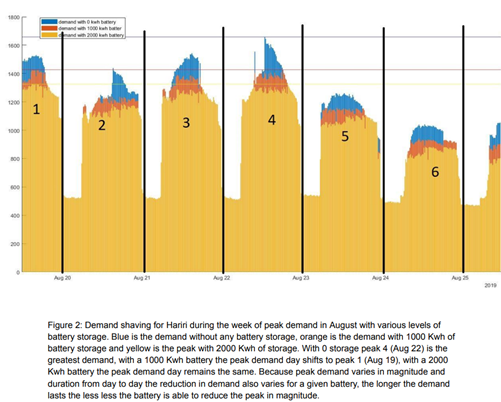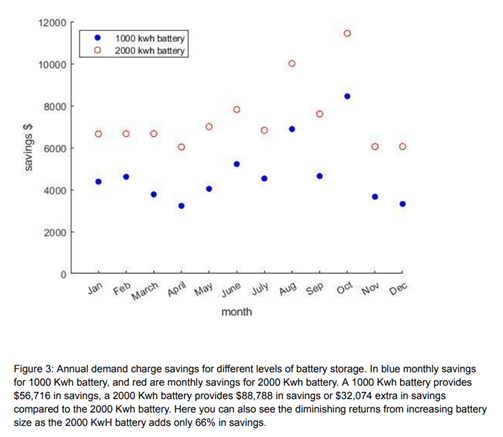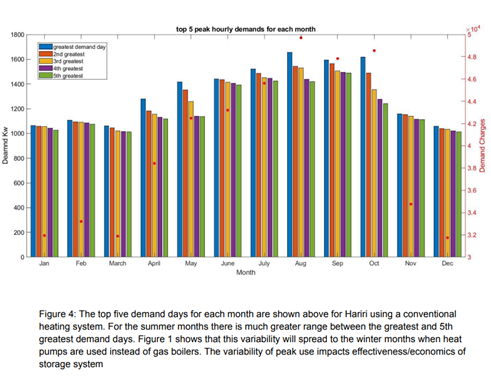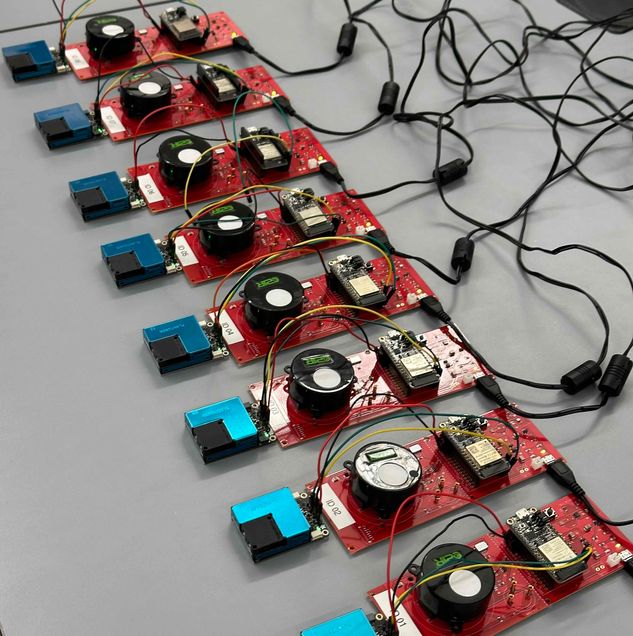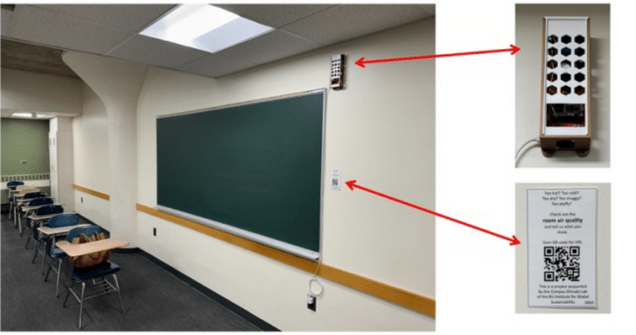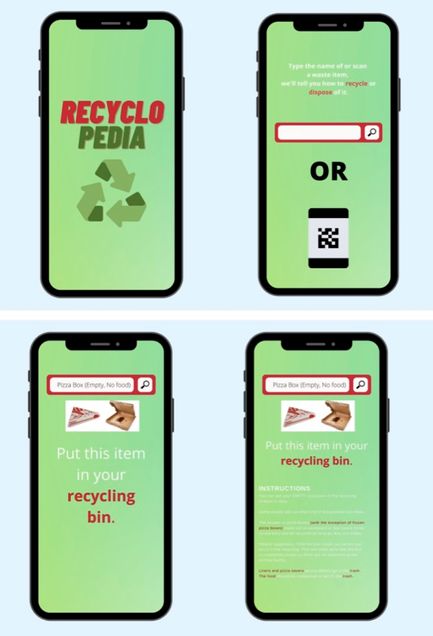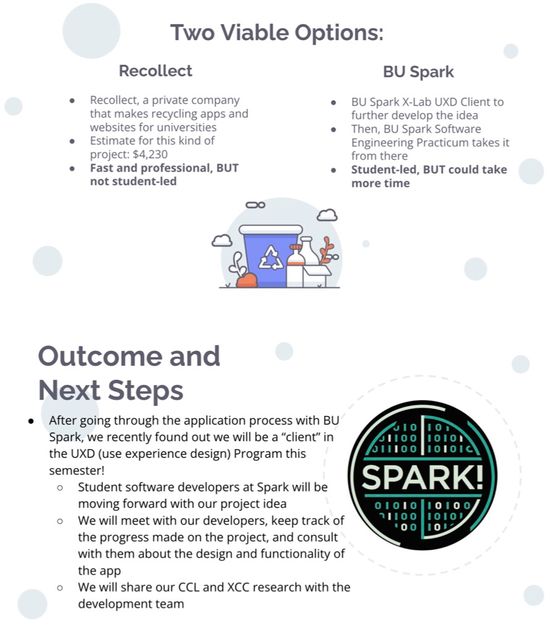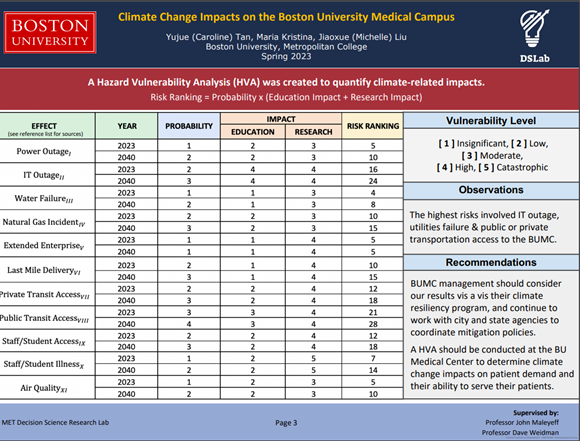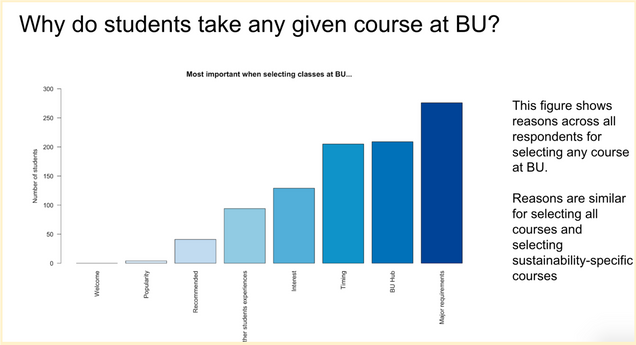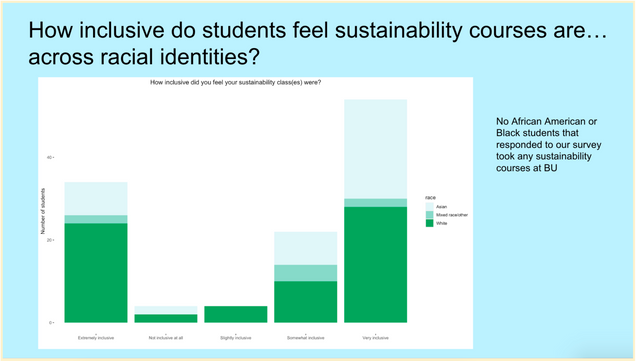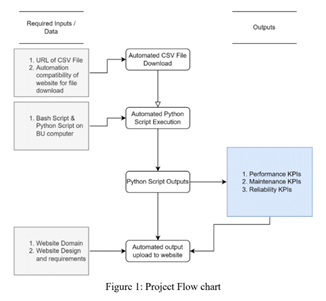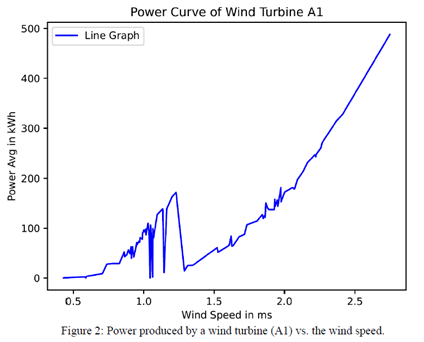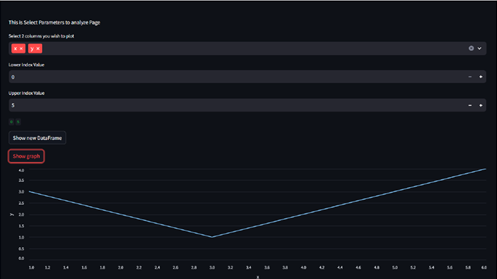Campus Climate Lab Project Archive
Learn more about previous Campus Climate Lab projects:
Buildings and Operations
Impacts of closure periods on BU CO2 emissions and local CO2 concentrations
Research team:
Lexia Cicone (Chemistry; Earth and Environment, CAS)
Mentor: Lucy Hutyra (Earth and Environment, CAS)
Timing: Awarded Summer 2020. Fall 2020, Spring 2021, Summer 2021.
![]()
This research team is assessing the influence of changes in campus occupancy on local CO2 concentrations, emissions, and Boston University (BU) energy use. In previous phases of research, a substantial increase in per capita electricity and gas use at BU was found during the COVID-19 shutdown period. Continued research will investigate how changes in building usage resulting from the lockdown will affect energy use, as well as make a comparison between BU-specific changes, and Massachusetts-wide changes in energy use. Ultimately, the goal of this research is to identify opportunities for BU energy use reductions associated with changing occupancy and behaviors.
Student Presentations:
September 9, 2020: Slide deck (PDF)
January 29, 2021: Video (@ 18:20). Slide deck (PDF)
April 20, 2021: Video (@ 32:36). Slide deck (PDF)
September 9, 2021: Video (@ 45:44). Slide deck (PDF)
Evaluation of alternative sensors to minimize HVAC energy use in Boston University buildings and ensure indoor air quality
Research team:
Jakub Zolkos (Electrical and Computer Engineering, ENG)
Vladimir Pyltsov (Mechanical Engineering, ENG)
Mertcan Cokbas (Electrical and Computer Engineering, ENG)
Mentor: Janusz Konrad (Electrical and Computer Engineering, ENG)
Mentor: Michael Gevelber (Mechanical Engineering, ENG)
Timing: Awarded Spring 2022. Fall 2022.

HVAC systems account for 40-60% of BU’s energy use in its large buildings, and this is primarily driven by the amount of airflow called for by building automation systems. While passive infra-red (PIR) sensors are being used in many newer classrooms and offices, they are only on-off and do not provide information to modulate airflow at intermediate levels. The proposed research aims to evaluate two alternative sensing approaches to “right-sizing” airflow based on the level of occupancy. One approach uses overhead fisheye cameras and AI algorithms, while the other system uses CO2 sensors and a mathematical model to infer occupancy from CO2 levels. The goal is to compare accuracy of both approaches in determining occupancy in large classrooms and open offices, and to provide an estimate of the potential savings offered by such technologies in several buildings with different room types. Our research team consists of undergraduate student Jakub Zolkos, PhD candidate Mertcan Cokbas and Professor Janusz Konrad, all from the Department of Electrical and Computer Engineering, who will work on the camera-based approach, as well as undergraduate student Vladimir Pyltsov and Professor Michael Gevelber, both from the Department of Mechanical Engineering, who will focus on the CO2- based approach and the estimation of potential energy savings.
Student Presentations:
May 16, 2022: Video (@ 25:24). Slide deck (PDF)
January 27, 2023: Slide deck (PowerPoint)
Transforming Cummington Mall: A walkable, climate-friendly future
Research team:
Zakaria Elkawa (International Relations, Pardee; Anthropology, CAS)
Zain Ahmed (Mechanical Engineering, ENG)
Ankit Patro (International Relations, Pardee School of Global Studies; Economics, CAS)
Mentor: Nathan Phillips (Earth and Environment, CAS)
Timing: Awarded Spring 2023.
People-oriented city design is the only way cities can achieve sustainability goals in ways that make the city a more just and community-oriented environment. Our project aims to develop a feasibility study that assesses how Boston University can re-design and further integrate Cummington Mall with its surrounding streets and buildings. The content of our project includes case studies that other cities have implemented, as well as scientific studies, both of which show the ease of how BU can implement change to make Cummington Mall a more welcoming, open space and also outline why such changes are necessary.
The project will be the first phase of the feasibility study, utilizing tactical urbanism as a framework to explore simple and effective measures that can make the area more dynamic, sustainable, and inviting to all members and commuters of the Boston University community. The first phase will also create a rendering to visualize how the area would look if such measures were implemented. The aim of the project is to allow for space to further improve our design in the future, all in the service of helping Boston University become a more people-oriented campus. Our team includes Zain Ahmed, Ankit Patro and is led by Zakaria Elkawa.
Mentorship and collaboration will be provided by Earth and Environment professor Nathan Phillips, Assistant Director of Transportation Demand Management and Planning Carl Larson, and Campus Planning and Operations.
Student Presentations:
April 12, 2023: Slide Deck (PDF)
Influence of landscape management practices on urban greenhouse gas budgets
Research team:
Wiley Hundertmark (Remote Sensing and Geospatial Sciences, CAS)
Mentors:
Lucy Hutyra (Earth and Environment, CAS)
Pam Templer (Biology, CAS)
Dennis Carlberg (Chief Sustainability Officer; Associate Vice President for Climate Action)
Timing: Awarded Spring 2020 and Summer 2020.
Winner of the 2021 Campus Sustainability Research Award in Undergraduate Research from the Association for the Advancement of Sustainability in Higher Education!
Research Team: Professors Lucy Hutyra (Earth & Environment, CAS) and Pamela Templer (Biology, CAS) brought a team of students together to investigate how much biological fluxes contribute to the campus CO2 budget. The team measured biological carbon uptake and loss processes from the ecosystems across BU’s campus. The team then digitized the university land cover to scale the results and merged estimates of BU’s fossil fuel emissions.
Findings: The team was surprised to learn that the lands that comprise BU’s campus were a net source of CO2 emissions.
Implementation: The research team met with BU Facilities Management & Operations to share these findings. As a result, in collaboration with the Hutyra Research Lab, BU will pilot changes to its landscape management practices to reduce emissions.
Student Presentations:
Slide Deck (PDF)
Rain gardens on Cummington Mall to support resilient infrastructure on Boston University’s campus
Research team:
Amir Wilson (Earth and Environment, CAS)
Ysabel Wulfing (Earth and Environmental Science; Marine Sciences, CAS)
Tessa Keeney (Environmental Analysis & Policy, CAS)
Rachel Koh (Business Administration, CAS)
Mentors:
Lisa Tornatore (BU Sustainability, Sustainability Director)
Nathan Phillips (Earth and Environment, CAS)
Timing: Awarded Spring 2022.
Timing: Awarded Spring 2022.
This project will study the feasibility of implementing rain gardens on BU’s campus. Rain gardens provide a beautiful and cost-effective way to mitigate future flooding risks and sewage overflows. The team consists of students studying business strategy, sustainable energy, earth & environmental science, environmental policy, and journalism. The faculty have background in plant physiology, natural gas infrastructure, and directing BU Sustainability projects.
Student Presentations:
May 16, 2022: Video (@ 32:21). Slide deck (PDF)
Quantifying scope 3 emissions associated with employee travel at Boston University
Research team:
Olivia Henning (Environmental Analysis and Policy, CAS)
Lucia Vilallonga (Statistics and Computer Science, CAS)
Mentor:
Jacqueline Ashmore (Institute for Sustainable Energy, Executive Director; Earth and Environment; Mechanical Engineering)
Timing: Awarded Fall 2020. Renewed Spring 2021.

As a team of Questrom MSMS students tackles the business-related aspects of offset purchasing programs in partnership with A Better City and BU Sustainability, our research team will assist in providing a scientific background and data science skills to the project to help align with the goals of BU’s Climate Action Plan. Our fall 2020 Campus Climate Lab research found that employee air travel emissions are very significant, and survey results suggest that employees expect to continue traveling as much as before the pandemic once recovery is achieved. These findings suggest that both offsets and reduction programs will play important roles in BU reaching its net-zero emissions goal. Once the MSMS project concludes, we will reevaluate this prior work and propose further behavior change programs to reduce flights in the future to work in tandem with the MSMS offsets program. Both students on this team are interns at BU Sustainability.
Student Presentations:
January 29, 2021: Video (@ 9:39). Slide deck (PDF) Final Report (PDF)
April 20, 2021: Video (@ 12:20). Slide deck (PDF) Final Report (PDF)
Article in WBUR.
Urban heat island effect: A study of various city surfaces and their impacts
Research team:
Abhi Lingareddy (High School Student, BUA)
Mentors:
Dan Li (Earth and Environment, CAS)
Victoria Perrone (Chemistry, BUA)
Timing: Awarded Spring 2021.
The goal of our project is to measure the impact of various surfaces found in an urban setting on local temperatures using sensors placed in several locations of interest on the BU campus. The main focus will be on the existing solutions to the urban heat island effect: white roofs, green roofs, and landscaping. Our research will quantify how effective solutions are at reducing temperatures in comparison to more typical surfaces found throughout the campus, and this will aid in the decision to invest time and money into converting existing surfaces into more sustainable ones. This research will be done by BUA student Abhi Lingareddy, BUA’s Chemistry Instructor and Director of Student Life Victoria Perrone, and Assistant Professor in the Earth & Environment Department Dan Li.
Student Presentations:
April 20, 2021: Video (@ 10:08). Slide deck (PDF)
Mapping noise pollution at Boston University and other Boston locations before, during, and after the pandemic with a goal to reduce noise pollution
Research team:
Alyssa Helmling (Biology, CAS)
Mentor: Richard Primack (Biology, CAS)
Timing: Awarded Summer 2021.
This research project will investigate how noise pollution—which is a concern for both human health and wildlife health—has changed as the global COVID-19 pandemic drastically altered sources of noise, such as road traffic, airplanes, and grounds maintenance. This study focuses on four locations: the Boston University campus, the Longwood medical area, Harvard Square, and the area of East Boston near the airport.
With the SPLnFFT mobile sound meter app, the Primack Lab has been collecting sound measurements before and during the pandemic, and these areas will be re-measured after pandemic restrictions end. These data will be used to make detailed sound maps, identify key sources of noise pollution, and make recommendations on how to reduce noise pollution and greenhouse gas emissions on the BU campus. Dr. Richard Primack is a conservation biologist and a Professor in the Biology Department; Alyssa Helmling is a senior Biology major and research assistant in the Primack Lab.
Student Presentations:
September 9, 2021: Video (@ 30:12).
Vehicle energy harvester
Research team:
Jainil Surelia (Mechanical Engineering, ENG)
Hoshing Lau (Mechanical Engineering, ENG)
Easus Jimenez Y West (Mechanical Engineering, ENG)
Ryan Indarto (Mechanical Engineering, ENG)
Mentor: Anthony Linn (Mechanical Engineering, ENG)
Timing: Awarded Spring 2023.
The Vehicle Energy Harvester project harvests electricity from vehicles passing on a road. The prototype will be installed on the surface of the road. The project would rely entirely on Mechanical and Electrical principles to achieve the desired results. From the Mechanical Department, 4 students and a faculty mentor are involved in the designing and execution of the project. Currently, there are no external forms of energy recycling at the parking lot, but we believe the consistent flow of cars in and out of the parking lot everyday offers a great opportunity to collect clean energy and distribute it across the utilities at the parking lot. That being said, our Capstone project aims to create a mechanism that can transform linear to rotational motion to power up a generator for power distribution. The entire mechanism goes underground, and the system will work as a typical parking lot speed bump.
Student Presentations:
April 12, 2023: Slide Deck (PDF)
Design of a building integrated PV system (BIPV) with energy storage for providing sustainable energy as a transition to decarbonize the BU campus
Previous Research Team:
Cristian Morales (Sociology, CAS)
Georges El Alam (Materials Science and Engineering, ENG)
Christian So (Computer Engineering, ENG)
Sana Almarzooqi (Systems Engineering, ENG)
Matthew Shulman (Mechanical Engineering, ENG)
Michael Crowley (Electrical Engineering, ENG)
Woud Alsadoun (Electrical Engineering, ENG)
Yu Guo (Mechanical Engineering, ENG)
Lexiao Lin (Electrical and Computer Engineering, ENG)
Sicheng Chen (Electrical and Computer Engineering, ENG)
Jackie Salamay (Electrical Engineering, ENG)
Sofia Kamal (Mechanical Engineering, ENG)
Mentors:
Daniel Cole (Electrical & Computer Engineering, ENG)
Malay Mazumder (Electrical & Computer Engineering, ENG)
Timing: Awarded Fall 2022, Summer 2023, Fall 2023
The goal of this project is to design a building-integrated solar power system with bifacial PV modules with diffuse reflectors and energy storage that can provide up to 30% more power output compared to that of traditional PV installations. The project will estimate the renewable energy production capability of the new system output that can replace a substantial fraction of the fuel-based energy used in the BU campus. Following the design, team members will construct a pilot plant in the lab for evaluating the performance of the new system. This project aims to work with the vice president for Sustainability at BU and the director of the planned maintenance and engineering of the campus buildings for selecting rooftops for outdoor evaluation of the new solar power systems with battery storage for safe and sustainable operation and perform a financial analysis.
Phase 2 will primarily focus on establishing a small laboratory scale solar power system and collect experimental data for evaluating the performance and make changes as needed. This will involve using Lithium iron phosphate (LFP) batteries which are considered safe for residential operation over many years. The laboratory-scale experimental setup will be tested outdoors for a couple of days for examining its outdoor performance and data collection.
Phase 3 will include constructing a lab scale solar energy system with small size solar panels for lab evaluation of the solar energy system and construct a pilot scale solar power plant with full size PV modules and hybrid energy storage devices for its installation on a rooftop of a BU campus building for outdoors performance assessments with respect to the operational and safety aspects. The goal is to use the the pilot scale system to demonstrate the potential utility of the system to decarbonize the BU campus providing sustainability and economic gain.
Final Report:
Final Report (PDF)
Identifying high-risk residences of interest for climate-responsive technologies
Research team:
Chen Han (Computer Information Systems, MET)
Alexandra Arias-Piranio (Earth and Environment, CAS)
Julianne Vaughan (Earth and Environment, CAS)
Leigh Mahoney (Earth and Environment, CAS)
Mentors:
James Baldwin (Earth and Environment, CAS)
Nathan Phillips (Earth and Environment, CAS; Pardee)
Robert Kaufman (Earth and Environment, CAS)
Timing: Awarded Fall 2023.
The purpose of our research is to advance BU’s equitable sustainable development goals of the Climate Action Plan and Extreme Weather Preparedness Plan by
(a) investigating the impact of the recent extreme heat climate on on-campus residents, and (b) proposing an allocation of renovation resources to housing units that demonstrate greater per capita heat burden and lack proper cooling technology installations. A comprehensive study will be conducted throughout the Fall 2023 Semester to analyze disproportionate urban heat island effects on BU housing residences and evaluate opportunities for implementing energy-efficient cooling appliance infrastructure. To achieve our analysis objectives, we will be inspecting trends in Boston’s climate data and city GIS maps, and comparing on-campus housing locations by the cost and redressability of their facilities needs. Our mission is to equip the University with a collective source of information to streamline climate-responsive preparatory action.
Final Presentation:
Slide Deck (PDF)
Water consumption & mitigation efforts
Research team:
Manpreet Singh (Global Policy, Environmental Policy, Pardee)
Rachel Hull (Global Policy, Pardee)
Mentor: Mahesh Karra (Director, Pardee)
Timing: Awarded Summer 2023, Fall 2023, Spring 2024
Boston University, as a non-state actor, plays a crucial role in water consumption and management in the city of Boston, serving a large population of students, faculty, visitors, and staff. This project aims to measure water consumption at the infrastructure level across all three BU campuses (CRC, MED, South/Fenway) with a goal to produce policy recommendations that BU can take to reduce per-capita water consumption. As BU expands, they are also in the process of renovating and retrofitting their buildings to make them more sustainable according to green certification requirements (LEEDs, STARS, etc).
Our analysis will utilize previously collected data on water use on all three BU campuses from FY 2006 to 2023. Phase 1 (completed during summer 2023) focused on reviewing building level data including building age, year of most recent renovation, size of building (sq ft), building type, and LEEDs. Phase 2 of this project will involve combining the data from phase 1 and include data focusing on type of water fixtures, cost of water consumption, BU pipe infrastructure, and green certification. This data collection and research will help us complete our end goal for Phase 2 which is to create a model for BU’s water consumption that showcases patterns in infrastructure that impact water consumption. The main goal of this project is to pinpoint specific sources of outsized water consumption and to recommend mitigation efforts that BU can take in order to reduce water consumption as they expand and make the campus meet green certification standards.
Student Presentations:
April 10, 2024: Slide Deck(PowerPoint)
Decision support for climate mitigation decision making
Research team:
Yura Gao (Applied Data Analytics, MET)
Kaumudi Dande (Applied Business Analytics, MET)
Mentors:
John Maleyeff (Enterprise Risk Management, MET)
David Weidman (Enterprise Risk Management, MET)
Timing: Awarded Spring 2024.
The proposed project concerns the development of a decision support system (DSS) to assist BU facility managers when they comapre options for responding to climate change risks. This work is motivated by the requirements set forth in the BU Climate Action plan that will require many BU buildings to undergo modifications. A challenge exists because climate risks will increase overtime so that options viable today may not be appropriate in the years to come. The project team will make use of decision technologies to design a DSS that accounts for the direct costs and the economic utilities decision makers assign to potential disruptions of university activities. It will utilize a color-coded decision aid to help decision makers visualize uncertainity, and the Analytical Hierarchy Process (AHP) approach where ranking of multi-criteria response options is done in a pairwise manner.
Student Presentations:
April 10, 2024: Slide Deck (PowerPoint)
Behavioral approach to reducing scope 3 air-travel emissions
Research team:
Andde Indaburu, (Marketing, Questrom)
Kathryn Kitayama, (Organizational Behavior, Questrom)
Mentor: Remi Trudel (Marketing, Questrom )
Timing: Awarded Spring 2024.
For employees at Boston University, flying for business travel is a necessary yet carbon-intensive aspect of their work that heavily contributes to scope 3 emissions. This project is interested in investigating a two layer question – first, how to reduce air-travel, and second, in the case of necessary air-travel, how to mitigate the carbon footprint of business travel. Through a combination of in-depth literature review and interviews, we will investigate best practices for reducing air-travel emissions from other organizations, seeking innovative alternatives and incentives for reduction and mitigation. Additionally, we will explore the human-factors involved in implementing such practices and strategies to offset emissions when travel is necessary, focusing on community buy-in and stakeholder attitudes to ensure successful implementation of carbon mitigation practices.
Final Presentation:
Slide Deck (PDF)
Developing heating electrification strategies to decarbonize Boston University's Charles River campus
Team members:
Keeley Bombard (Earth and Environment, CAS),
Gayatri Sundar Rajan (Mechanical Engineering, ENG)
Sabrina Dilig (Mechanical Engineering, ENG)
Cathy Cheng (Mechanical Engineering, ENG)
Amanda Baumann (Mechanical Engineering, ENG
Christopher Lambert (Mechanical Engineering, ENG)
Anjena Daswani (MS)
James Roberts (Mechanical Engineering, ENG)
Destiny Kanu (Mechanical Engineering, ENG)
Josh Handcock (Mechanical Engineering, ENG)
Mentors:
Nathan Phillips (Earth and Environment, CAS),
Michael Gevelber (Mechanical Engineering, ENG)
Timing: Awarded Summer 2020. Renewed Fall 2020, Spring 2021, Summer 2021, Fall 2021, Spring 2022, Fall 2022, Summer 2023, Spring 2024, Summer 2024.
In 2017, the Boston University Climate Action Plan established the goal for the university to achieve carbon neutrality by 2040. To reach this goal, it is critical to develop a solution to heating from fossil fuels — which represented 40% of BU’s emissions prior to December 2020. In the first phase of research (Summer 2020), the team of Gayatri Sundar Rajan, Professor Michael Gevelber, Keeley Bombard, and Professor Nathan Phillips developed a preliminary strategy to electrify the majority of Boston University’s fossil-based heating energy use, identified system design requirements, and evaluated alternative technologies including GeoMicroDistrict (GMD).
In the second phase, Gayatri Sundar Rajan, Sabrina Dilig, Cathy Cheng, and Professor Gevelber reviewed phase 1 findings with industry experts and BU facilities staff, developed an in-depth HVAC and electrical demand analysis for several key building candidates, developed solutions to limit electrical load increase, and determined the cost and corresponding carbon reduction of alternative strategies.
In the third phase of the project, we investigated key technical issues to implementing the retrofit electrification strategy on 17 key buildings through assessing the compatibility of the electrification strategy with buildings on our campus steam loops, validating the performance of low-temperature air source heat pumps, and evaluating buildings’ electrical capacities.
In the fourth phase, we will continue the detailed building-by-building analysis, with an emphasis on the steam loops, how summer reheat loads can be met, estimating potential energy-saving measures to reduce peak electrical loads and GHG emissions, and updating financial plans. In the fifth phase, we will discuss the selection of pilot demonstrating buildings, TA study, & cost estimates. Phase six includes reviewing previous analysis and updating financial analysis from previous phases of this project in order to present to both BU’s Operations Climate Action Committee and the BU Operations leadership group. Phase six continues into the 2024 calenday tear to develop the planning to implement the proposed decarbonization of the 13 major buildings on CRC and 3 pilot projects, help BU identify the key opportunities and issues to implement this plan that can reduce BU’s green house gas emissions by 40%, and minimize alternative compliance payment under Boston BERDO and emission offset payments.
Student Presentations:
September 9, 2020: Slide deck (PDF)
January 29, 2021: Video (@ 27:17). Slide deck (PDF)
April 20, 2021: Video (@ 42:06). Slide deck (PDF)
September 9, 2021: Video (@ 36:00). Slide deck (PDF)
January 28, 2022: Video (@ 1:01:42). Slide deck (PDF)
May 16, 2022: Video (@ 19:38). Slide deck (PDF)
January 27, 2023: Slide deck (PowerPoint)
Study demand/grid implications of all electric building for heating system and potential solution of thermal/electric storage
Research team:
James Roberts (Mechanical Engineering, ENG)
Mentor: Michael Gevelber (Mechanical Engineering, ENG)
Timing: Awarded Spring 2023, Fall 2023, Spring 2024, Fall 2024
This project will continue our research in analyzing thermal and electric storage options for all electric buildings such as the Center for Computing and Data Sciences (CDS) and the associated impact on building demand and demand charges. Thermal loads will be investigated by comparing loads due to airflow and surface heat loss, and how these factors determine building heating/cooling loads. Thermal load analysis will guide investigations of energy efficiency opportunities for large buildings drawing from the technology deployed in CDS to build a practical understanding of highly efficient systems. The potential for implementing ground source heat pumps and their cost will also be investigated as part of implementing electric heating systems.
Student Presentations:
April 10, 2024: Slide Deck (PowerPoint)
Continuous indoor air quality assessment for BU buildings
Research team:
Celine Chen (Electrical and Computer Engineering, ENG)
Primah Muwanga (Computing and Data Science, ENG)
Ellen Zheng (Electrical and Computer Engineering, ENG)
Maribel Boujaoude (Electrical and Computer Engineering, ENG)
Yangyang Zhang (Electrical and Computer Engineering, ENG)
Mentor: Thomas Little (Electrical and Computer Engineering, ENG)
Timing: Awarded Fall 2023, Spring 2024, Fall 2024
Last year we demonstrated the capability of using wireless air quality sensors in eight classrooms to provide real-time feedback on the environmental conditions including a means for harvesting occupant feedback. In this follow-on project we are changing our focus from single rooms to full buildings. Data from each measured space will be sampled and analyzed in aggregate for the purpose of supporting recommendations for air quality and energy-efficiency improvements. To meet the scale of this effort we will construct 20 new low-cost sensor devices based on a new design. These are intended to be deployed, and reused in target buildings, for whole building air quality and energy efficiency assessment.
Student Presentations:
Fall 2023: Student Poster (PDF)
April 10, 2024: Slide Deck (PowerPoint)
Reducing Waste
Establishing sustainable laboratory practices and standard operating procedures that offset waste production in biomedical research
Research team:
Carly Golden (PhD student, MED)
Mentors:
Angie Serrano (Vascular Biology, MED)
Saylor Williams (Serrano Lab Manager, MED)
Greg Miller (CReM Lab Manager, MED)
Timing: Awarded Fall 2022.
This project aims to evaluate the effectiveness of different waste management schemes and sustainability assessments targeting the unavoidable waste produced in biomedical research practices. Team members Carly Golden (Ph.D. student), Saylor Williams (Lab manager), Angie Serrano (PI mentor), and Greg Miller (CReM Lab Manager) will implement several recycling services and sustainable practices, such as Kimberly Clark Right Cycle program, My Green Lab, Polycarbin, and energy usage monitoring of large equipment, which will allow them to track their overall impact on the environment. A second goal of this project is to establish standard operating procedures for sustainable practices that can be easily incorporated into everyday research tasks and adopted by the wider BUSM community when addressing their waste production in research labs.
Student Presentations:
January 27, 2023: Slide deck (PowerPoint)
April 12, 2023: Slide deck (PowerPoint)
Post-consumer waste reduction machine learning program
Research team:
Muntasir Meah (CAS)
Mentors:
Ziba Cranmer (BU SPARK!, Director)
Alexandra Raczka (BU Dining Services, Sustainability Director)
Timing: Awarded Spring 2022. Renewed Fall 2022.
This project pilots a machine-learning image classification model available on TensorFlow to classify images of post-consumer plate waste into categories of commonly wasted meals and determine the most common sources of post-consumer waste at Boston University’s dining halls. The improved identification process will allow university dining managers to better understand the most wasted menu items and modify menus to reduce post-consumer food waste. Undergraduate student Muntasir Meah serves as a Sustainability Intern for Boston University Dining with Alexandra Raczka, the Sustainability Director of BU Dining Services and is advised by Ziba Cranmer, the Director of BU SPARK! who has several years experience in sustainable business and innovation. This project will be implemented to discover the most commonly wasted meals to modify menus, recipes, and/or portion sizes and thereby reduce Scope 3 carbon emissions generated in the supply chain of food production thus assisting Boston University in achieving Zero Waste targets as part of their Climate Action Plan.
Student Presentations:
May 16, 2022: Video (@ 13:15). Slide deck (PDF)
January 27, 2023: Slide deck (PowerPoint)
Zero waste on the Charles River campus: Development of a Recyclopedia app to increase student accuracy and confidence in waste sorting (Phase One)
Research team:
Allison Chodes (Psychology, CAS)
Muhammad Essa Tabish Chawla (Economics, CAS)
Keeley Bombard (Environmental Analysis and Policy, CAS)
Mentor: Rebecca Kinraide (CAS)
Timing: Awarded Summer 2021.
This project came out of the BU HUB Cross-College Challenge Zero Waste course (XC 433), which tasked students with creating a campus initiative to help Boston University reach its goal of zero waste by 2030. Team members Allison Chodes, Muhammad Essa Tabish Chawla, and Keeley Bombard, advised by Professor Rebecca Kinraide, will work closely together to continue the necessary research to develop an app to help students sort waste effectively and confidently. This project plans to shape the Recylopedia resource, available on the Sustainability@BU website, into an application to help improve waste management on Boston University’s Charles River Campus. This research team will use its Campus Climate Lab funding to continue the work previously started through the Zero Waste course to create a successful Recyclopedia application that helps Boston University meet its zero waste goals.
Student Presentations:
January 28, 2022: Video (@ 45:11). Slide deck (PDF)
Analysis of willingness to adopt personal care and cleaning products refill habits by undergraduate students living in BU dorms
Research team:
Guillermo Gallego (Business Administration, Questrom)
Mentor: Remi Trudel (Marketing, Questrom)
Timing: Awarded Spring 2021.
This project aims to assess undergraduate student willingness to adopt refill habits by using vending machines as a way to stop single-use plastic waste generation stemming from personal care and cleaning products. This research will be sponsored by Professor Remi Trudel, whose research agenda is driven by a desire to understand consumer decision-making in three substantive areas – sustainability, health and diet, and personal finance – so as to provide consumers, marketers, and policymakers with the means to make better, more sustainable decisions for themselves, society, and the environment.
Research will be conducted by Social Impact MBA student Guillermo Gallego, who has significant experience introducing environmentally friendly electronic technologies in new markets with the 500-Fortune company ABB. Dr. Trudel has published in the top academic journals including the Journal of Consumer Research, Journal of Marketing Research, and the Journal of Consumer Psychology, and his research has been covered by NPR, The New York Times, The Wall Street Journal, The Washington Post, Scientific American, The Atlantic, The Globe and Mail, Science 2.0, Harvard Business Review, and many other regional news outlets.
Student Presentations:
April 20, 2021: Video (@ 7:46).
Improved Seabin technology: Charles River cleaning initiative
Research team:
Inal Shomakhov (Mechanical Engineering, ENG)
Nahiyan Muhammad (Mechanical Engineering, ENG)
Mentor: Raymond Nagem (Mechanical Engineering, ENG)
Timing: Awarded Summer 2023.
Rivers and other water bodies, such as the Charles River, are vital resources that provide clean water for drinking, recreation, and habitat for aquatic life. Unfortunately, due to human activities, these water bodies have become severely polluted by non-degradable plastic litter, especially near docks or lagoons. The proposed research project aims to address this issue on the BU campus territory by designing a water surface litter collector, based on the Seabin Project, that is adaptable to shifts in water level, energy-free, and effective at collecting plastic while being safe for marine life. Currently, we work on designing an energy-free pressure pump and researching filtering methods and sustainable materials that will be used in manufacturing.
Final Report:
Final Report (PDF)
Nudging sustainability conscious behavior: Data-driven incentive framework for zero waste
Research team:
In Young Park (Biomedical Engineering, ENG)
Mentor: Ziba Cranmer (BU Spark!, Director)
Timing: Awarded Spring 2023, Fall 2023.
Indirect emissions through improper waste disposal continue to be a problem for many organizations including BU. As waste disposal is primarily driven by the behavior of individuals, a true zero waste status will be attainable only by engaging students and faculty on campus. Leveraging real-time live waste intelligence data, the team will apply data science and machine learning to analyze waste contamination and disposal patterns and propose optimal strategies to nudge sustainability-conscious behaviors on campus. The work is supervised by Ziba Cranmer (Director, BU Spark!) who offers expertise in innovation and sustainability.
Final Report:
Final Report (PDF)
Trash classification for efficient recycling
Research team:
Rohit Vemparaka (Data-Centric Computing, CAS)
Aru Pandey (Data-Centric Computing, CAS)
Mentor: Sahar Sharifzadeh (Chemistry, ENG)
Timing: Awarded Spring 2024.
This project introduces a Spectroscopy-Enhanced Waste Classification System (SEWCS) to BU. Addressing challenges in recycling, SEWCS aims to reduce contamination, improve recovered materials’ quality, and serve as an educational tool. By integrating indicators with waste bins on campus, it helps user identify recyclability. Real-time data from SEWCS informs decision-making, aligning with BU’s sustainability goals and fostering a culture of environmental responsibility.
Quantifying microplastic emissions and investigating filtration methods
Research team:
Lucas Gibbons (Physics, CAS)
Yiyang Jin (Biology, CAS)
Mentor: Raymond Nagem (Mechanical Engineering, ENG)
Timing: Awarded Fall 2023, Spring 2024, Fall 2024, Spring 2025
Microplastics have been shown to threaten environmental and human health, with the washing of synthetic fabrics representing a significant source of emissions. This project aims to evaluate the microplastic output of BU laundry facilities and investigate ways to mitigate emissions, specifically through research and development of high-throughput filtering solutions which would match the needs of the BU community. The goal of this project is to produce an actionable plan for eliminating microplastics from BU laundry wastewater.
Student Presentations:
April 10, 2024: Slide Deck (PowerPoint)
Activate BU: Electricity demand response
Research team:
Melissa Martin (Earth and Environment, CAS)
Miya Peterson (Earth and Environment, CAS)
Mentor: Nathan Phillips (Earth and Environment, CAS)
Timing: Awarded Fall 2024, Spring 2025
This project aims to activate BU campus residents to demonstrate climate benefits of electric demand response. Demand response is the practice of preemptively shifting or reducing electricity consumption from projected peak demand periods on the grid, saving money and preserving air quality and the climate. We will engage residential communities and install whole-residence electric service line meters and hot water meters, in selected traditional Boston row houses in South Campus and/or Bay State Road. We will quantify demand response in residences provided with education, monetary incentives and/or community-building activities, compared to a reference house. The results from this study will provide estimates of energy, carbon, pollution, and financial benefits of demand response, particularly when scaled to comparable housing stock or data centers across campus, the City of Boston and beyond.
Advocacy and Activism
Warren rooftop mini-garden
Research team:
Sidney Hare (Earth and Environment, CAS)
Stella Dzialas (Earth and Environment, CAS)
Mentors:
Curtis Woodcock (Earth and Environment, CAS)
Lisa Tornatore (BU Sustainability, Sustainability Director)
Dennis Carlberg (BU Sustainability, Associate Vice President for University Sustainability)
Timing: Awarded Summer 2021. Renewed Fall 2021, Spring 2022.
The Warren Garden is going into its second growing season, led by Stella Dzialas (CAS ’24) and Dr. Curtis Woodcock (Earth & Environment). After a successful pilot season in Summer 2021, the project is now expanding production and getting more BU students involved. The goals of this project are to promote sustainable agriculture, create a productive green space on campus, and provide fresh produce to students & the community. This work will engage the Boston University community and help increase the amount of green space on campus.
Student Presentations:
September 9, 2021: Video (@ 54:26).
October 28, 2021: Feature in BU Today.
January 28, 2022: Video (@ 55:22). Slide deck (PDF)
Natural dyes & pigments garden at Boston University
Research team:
Emily Manning-Mingle (Painting, CFA)
Sohyoung Park (Sculpture, CFA)
Minju (River) Kim (Painting, CFA)
Leah Naxton (Sculpture, CFA)
Sasha Nemi Lato (Costume Production, CFA)
Evan Petrow (Costume Production, CFA)
Jonathan Pinchera (Graphic Design, CFA)
Jayna Mikolaitis (Graphic Design; Painting, CFA)
Lily Fine (Printmaking, CFA)
Mentors:
Breehan James (Painting, CFA)
Richard Raiselis (Painting, CFA)
Denise Wallace-Spriggs (Costume Crafts, CFA)
Dana Clancy (Director, CFA; Painting, CFA)
Timing: Awarded Summer 2022.
The power of art to communicate sustainability, build community and achieve system change
Research team:
Valerio Iannucci (Business Administration, Questrom)
Talya Havivi (Sociology, CAS)
Nikki H. Huang (Sociology, CAS)
Timing: Awarded Fall 2022.
Performance art (in its various forms) is among the oldest and most meaningful expressions of human empowerment, but has long been underlooked as means to foster awareness and involvement. Social movement activists have instead relied on embodied art to achieve inclusion and scale. This project is lead by Questrom PhD student Valerio Iannucci (mentor) and CAS Sociology students Talya Havivi and Nikki H. Huang. They aim to triangulate artifacts and manuscripts from archives across the nation with an ethnographic observation of climate change activists in Boston in an effort to understand how public display of art can foster collective engagement on the issue of sustainability and equitable futures.
Student Presentations:
January 27, 2023: Slide deck (PowerPoint)
Aquaponics, art, and indigenous food sovereignty
Research team:
Matthew Manberg (Earth and Environment, CAS)
Natalie Erb (Earth and Environment, CAS)
Claire Gardner (School of Theatre, CFA)
Mentors:
Salvatore Genovesse (Natural Sciences and Mathematics, CGS)
Nathan Phillips (Earth and Environment, CAS)
Timing: Awarded Spring 2023.
This project will display multi-media paintings on recycled materials of Wampanoag peoples and their traditional food sources mounted on two tanks. The tanks will come from a study aiming to extract data from the potential of algae growth. In the Art Exhibit, this team will work with the Wampanoag nation utilizing an interview with interdisciplinary artist and activist Siobhan Growing Elm Brown to investigate methods of combating environmental racism through the affirmation of indigenous sovereignty and food sovereignty.
This project forefronts the power of art is that it is a catalyst to communicate sustainability, build community, and achieve system change in the context of the milieu of climate change discussion at BU. It gives the indigenous community, who experience disproportionate environmental racism, a platform. The research in aquaponics explores aquaponics’ advantage to sequester more carbon, cut labor costs, and avoid soil degradation in the context of indigenous food insecurity. In doing so, the university is elevating its position in addressing the broader challenges of climate change in the understanding of all community members.
Student Presentations:
April 12, 2023: Slide Deck (PDF)
Living faithfully in the anthropocene
Research team:
Rachel Barton (Theology, STH)
Mentor: Rebecca Copeland (Theology, STH)
Timing: Awarded Spring 2023.
This project will gather faith leaders and groups across campus to develop faith-based responses to Climate Change. By bringing leaders from across different faith traditions into dialogue across differences and conversations centered around environmental justice, this project seeks to galvanize faithful commitments to care for the Earth into inter-faith actions that support a more just and whole campus and community at BU. This project used the BU campus as a living laboratory to test the hypothesis that there is appetite for interfaith dialogue and action around environmental justice at BU among the undergraduate population.
Student Presentations:
April 12, 2023: Slide Deck (PowerPoint)
Growing community on campus
Research team:
Renata Feinstein (Education and Human Development, Wheelock)
Matthew Kalinowski (Earth and Environment, CAS)
Charlotte Galusza (Earth and Environment, CAS)
Carolina Ceribelli (Education and Human Development, Wheelock)
Sophia Tigges (Earth and Environment, CAS)
Mentors:
Ellen Faszewski (Education and Human Development, Wheelock)
Thomas J. McKenna (Education and Human Development, Wheelock)
Nathan Phillips (Earth and Environment, CAS; Pardee)
Timing: Awarded Summer 2023.
Over the summer and fall of 2023, a community garden network will be developed on campus with an established distribution system. The Warren Towers Garden and the Fenway rooftop garden have been extremely popular with students, and our project aims to expand access, student involvement, and increase campus-grown fresh produce. Establishing a permanent greenhouse on campus this year will provide the long term sustainability necessary for growing both annual and perennial crops for years to come.
Student Presentations:
April 10, 2024: Slide Deck (PDF)
Project spotlight.
Indexing BU's green space utilization for equitable distribution
Research team:
Mya Briones (Earth and Environment, CAS)
Jessica Schwarz (Earth and Environment, CAS)
Mentor: Ian Smith (Earth and Environment, CAS)
Timing: Awarded Fall 2023.
Novel evidence-based guidelines for greener, healthier, more resilient urban communities recommend that residents should be able to see three trees from their home, neighborhoods should have at least 30% canopy cover, and all residents should live within 300 meters of an open green space. Our project aims to evaluate the extent to which Boston University’s urban campuses meet these guidelines. Furthermore, we will explore the extent to which access to green space is equitably distributed and identify pathways for improving access to green space and overall green space provision.
Student Presentations:
April 10, 2024: Slide Deck (PowerPoint)
Indigenous curricular and cultural exchange gaps at BU
Research team:
Elizabeth Kostina (Sociology; Architectural Studies, CAS)
Delaney Foster (Marine Program; Earth and Environment, CAS)
Selby Vaughn (Biology, CAS)
Mentor: Nathan Phillips (Earth and Environment, CAS)
Timing: Awarded Spring 2024.
To better support environmental stewardship, it is necessary for higher education institutions, including Boston University, to strengthen curricular and cultural offerings related to indigenous knowledge, perspectives, and practices. This project aims to understand the gaps and possible shortcomings at Boston University by conducting comprehensive research in this area. This research will entail a literature review, analyses of peer institutions’ programs, and the facilitation of workshops with students, faculty, staff, and local indigenous community members. A final report will be developed that identifies specific action items and recommendations to Boston University that articulate what the institution can do to advance this topic in the university’s curriculum, activities, and spaces.
Final Report:
Final Report (PDF)
Student-generated solution for environmental justice at Boston University
Research team:
Alexia Nastasia (Kilchand Honors College, CAS, Pardee)
Abby Dandrow (Anthropology, CAS)
Cole Wilkins (Anthropology, CAS)
Mentor: Eric Michael Kelley (Visiting Lecturer, Anthropology, CAS)
Mentor: Caterina Scaramelli (Earth and Environment, CAS)
Previous Team Members:
Isabella Bremer (Film and Television, COM)
Timing: Awarded Fall 2023, Spring 2024, Fall 2024
Boston University has recognized in its Climate Action Plan that climate change is a seminal issue of our time. Effectively addressing this issue cannot be done without incorporating into climate action an environmental justice agenda, with support from a broad cross-section of university constituents, including students. This research project seeks to analyze how Boston University can better integrate into climate action an environmental justice agenda, with support from its diverse student communities. The research project is an applied anthropological study with a community action focus endeavoring to assess diverse students’ perceptions of environmental justice at Boston University in order to improve the university’s environmental justice efforts based on diverse underrepresented student input and contribution. Grounded in an intersectional approach, the project will engage research participants from diverse communities, including BIPOC students, DACA students, students with recent immigrant backgrounds, students with refugee status, international students, and LGBTQ students from Boston University’s main campus, the Charles River Campus. This research team includes: students Alexia Nastasia (team lead), Isabella (Bella) Bremer, and Abby Dandrow; Anthropology Department Visiting Lecturer Eric Michael Kelley (faculty mentor) and Department of Earth and Environment Senior Lecturer Caterina Scaramelli (faculty co-mentor); and two staff members, James Eddy, Associate Director of the Howard Thurman Center for Common Ground, and Alison Parker, Instructional Services Coordinator at Geddes Language Center, as operations partners.
Student Presentations:
April 10, 2024: Slide Deck (PowerPoint)
Climate and Health
Boston University Medical Center: Climate change impacts & mitigation strategies
Research team:
Jiaoxue Liu (Applied Business Analytics, MET)
Yujue Tan (Applied Business Analytics, MET)
Mentors:
John Maleyeff (Enterprise Risk Management, MET)
David Weidman (Enterprise Risk Management, MET)
Timing: Awarded Fall 2022.
This project addresses how climate change will impact the ability of the Boston Medical Center to effectively serve its patients and aims to recommend mitigation strategies that create resiliency to confront these impacts. Climate-related risks that will affect both patient demand and the medical center’s supply chain will be identified and their likelihood and severities quantified. The project will be supervised by BU Metropolitan College faculty members John Maleyeff and David Weidman, who offer their expertise in supply chain and emergency management. The work will be performed by two master’s degree students (Yujue Tan and Jiaoxue Liu), who are studying enterprise risk management and applied business analytics.
Student Presentations:
April 12, 2023: Slide Deck (PDF)
Abstracts:
University Climate Change Risk Assessment (PDF), accepted to present at the 2023 Annual Conference of the Decision Sciences Institute (DSI).
Evaluating the efficacy of extreme weather and climate preparedness across Boston University campuses
Research team:
Quinn Adams (Population Health, SPH)
Neil Singh Bedi (Medical Sciences, SPH)
Katharine Teigen (Environmental Health, SPH)
Mentors:
Amruta Nori-Sarma (Environmental Health, SPH)
Gregory Wellenius (Environmental Health, SPH)
Timing: Awarded Fall 2022.
Extreme weather events are expected to become more frequent and severe with continued climate change. This project aims to critically review Boston University’s existing extreme weather preparedness plan (EWPP) and evaluate community needs by assessing perceptions, utilization, and critiques of ongoing extreme weather preparedness activities across BU’s Charles River and Medical Campuses. Through a qualitative investigation, we hope to identify opportunities for increased accessibility to the services provided by the EWPP, particularly among vulnerable groups within the BU community. Our team consists of PhD student, Quinn Adams; medical student, Neil Singh Bedi; MPH student, Katharine Teigen; and professors Amruta Nori-Sarma and Gregory Wellenius, all affiliated with the Department of Environmental Health at the School of Public Health.
Student Presentations:
January 27, 2023: Slide deck (PowerPoint)
Urban air pollution monitors
Research team:
Tahsin Tasnim (Mechanical Engineering, ENG)
James Roberts (Mechanical Engineering, ENG)
Andrew Zhang (Mechanical Engineering, ENG)
Tessa Graebner (Mechanical Engineering, ENG)
Mentor: Emily Ryan (Mechanical Engineering, ENG)
Previous research team members:
Benjamin Pedi (Mechanical Engineering, ENG)
Lorenzo Barale (Mechanical Engineering, ENG)
Sofiya Filippova (Mechanical Engineering, ENG)
Maya Lobel (Mechanical Engineering, ENG)
Kai Raina Tung (Mechanical Engineering, ENG)
Luisa DiLorenzo (Mechanical Engineering, ENG)
Leon Long (Electrical and Computer Engineering, ENG)
Logan Rajah (Earth and Environment, CAS)
Timing: Awarded Summer 2023, Fall 2023, Spring 2024, Fall 2024, Spring 2025
Phase 1: This research project is looking at the development of low cost mobile sensor packs designed to measure local pollution levels within urban environments. In this project we will use the previously developed sensors along with higher end research grade and regulatory grade sensors to understand how accurate the lower cost sensors are and if they can be used to collect reliable and highly resolved spatial and temporal air pollution data around the city. The longer term objective of this project is to create a sensor network utilizing a mobile business (i.e. bike shares, buses, shared rides, etc.) to collect real time data for communities to understand local air quality conditions, and for governments to understand the effects of traffic patterns, bus routes, airport traffic, etc. on local communities.
Phase 2: Detailed in the Project Spotlight.
Student Presentations:
April 10, 2024: Slide Deck (PowerPoint)
BU climate resiliency: Geospatial analysis of nature-based solutions
Research team:
Jessica Schwarz (Earth and Environment, CAS)
Rori McCutcheon (Earth and Environment, CAS)
Mentor: Ian Smith (Earth and Environment, CAS)
Timing: Awarded Fall 2024, Spring 2025
Urban areas are disproportionately vulnerable to the impacts of climate change, such as rising sea levels, intensified rainfall, and extreme temperatures. As urbanization and population growth accelerate, urban areas face substantial challenges in building resilience to climate conditions. Nature-Based Solutions (NBS)—which utilize natural processes to tackle environmental issues while providing societal benefits—provide cost-effective opportunities for bolstering urban resilience while simultaneously providing numerous co-benefits. Our research team will tackle the issue of climate resiliency on BU’s campus by using a state-of-the-art geospatial methodology to identify NBS investment opportunities to reduce campus flood risk, while providing co-benefits related to heat, health/recreation, and social cohesion.
Curriculum Development
Fostering diversity in sustainability at BU: An assessment of undergraduates’ perceived barriers to and experiences with sustainability educational opportunities
Research team:
Alice Scollins (Political Science, CAS)
Mya Briones (Environmental Analysis & Policy, CAS)
Mentors:
Anne Short Gianotti (Earth and Environment, CAS)
Abigail Sulivan (Earth and Environment, CAS)
Lisa Tornatore (BU Sustainability, Sustainability Director)
Gabriela Boscio Santos (BU Sustainability, University Sustainability)
Timing: Awarded Fall 2021. Renewed Spring 2022, Fall 2022.
This project investigates how undergraduate students at BU perceive, decide to engage with (or not), and experience sustainability-oriented educational opportunities at BU. The final steps of our project will include focus groups with both student groups and sustainability faculty, which is enhancing our survey research that was previously compiled during the Fall 2021 and Spring 2022 semesters. The research activities will be conducted by Alice Scollins, a Political Science undergraduate student, and Mya Briones, an Environmental Analysis and Policy undergraduate student. Mentorship and collaboration will be provided by Earth and Environment professors Anne Short Gianotti and Abigail Sullivan, and BU Sustainability Director Lisa Tornatore. Ultimately, the goal of the project is to contribute to BU’s efforts to ensure “every undergraduate [is] touched in some way” by sustainability and climate education (as outlined in section VII of BU’s Climate Action Plan).
Student Presentations:
May 16, 2022: Video (@ 6:41). Slide deck (PDF)
January 27, 2023: Slide deck (PowerPoint)
April 12, 2023: Slide deck (PDF)
Promoting environmental conservation attitudes within and beyond the BU community through understanding of biological evolution
Research team:
Lizette Pizza Becerra (Developmental Science; Psychhological and Brain Sciences, CAS)
Sophie Zimbler (Communications; Psychological and Brain Sciences, CAS)
Mentor: Deborah Kelemen (Psychological and Brain Sciences, CAS)
Timing: Awarded Spring 2023.
Amidst the environmental crisis, promoting climate concern through education should be a priority. This intervention project explores whether learning about the mechanics of biological evolution (e.g. common descent) alters people’s beliefs about their relationship with nature (e.g., the belief that humans are superior to other living things) and promotes climate mitigation actions among the BU community and more broadly. Our team will examine the impact of an innovative narrative-based curricular approach on our focal outcomes using pre- and post-test surveys. The goal of our project is to provide BU and other institutions with an intervention that can be integrated into their curricula to promote sustainability.
Student Presentations:
April 12, 2023: Slide Deck (PDF)
BU wind data analysis and curriculum development
Research team:
Chaitanya Giridhar (Mechanical Engineering, ENG)
Atharva Khandekar (Mechanical Engineering, ENG)
Mentor: Emily Ryan (Mechanical Engineering, ENG)
Timing: Awarded Fall 2023, Spring 2024.
BU receives data from 97 turbines from a wind farm leased by BU in South Dakota. This data includes temperature, direction, wind speed, rotor speed, power, and operating state for each turbine every 15 minutes throughout the year. This leads to a large amount of data that is going underutilized by BU’s community. In this work codes for automatic data analysis will be developed and used to develop curriculum to teach the BU community about the wind farm and BU’s efforts to address climate change.
Student Presentations:
April 10, 2024: Slide Deck (PDF)
CFA Color Garden
Research team:
Anthony Venturi (Painting, CFA)
Lauren Boysa (Painting, CFA)
Julia Cheung (Graphic Design, CFA)
Natalie Seitz (Graphic Design, CFA)
Mentors:
Dana Clancy (Director, CFA)
Breehan James (Painting, CFA)
Richard Ryan (Painting, CFA)
Gregory Gomez (Sculpture; Drawing, CFA)
E. Tubergen (Sculpture, CFA)
Rebecca Bourgault (Art Education, CFA)
Susan Mickey (Director, CFA)
Timing: Awarded Fall 2023, Spring 2024, Summer 2024, Fall 2024.
This proposed outdoor classroom and plant garden will address the Climate Advancement Plan (CAP) challenge to incorporate new green spaces and plantings along the BU campus. The challenge of this project is to change a less-used green space in the campus arts district to a node for students across disciplines to learn more about plants, cultural plant use, indigenous culture, and sustainability. Given research about the impact of green spaces on study, information retention, relaxation, and wellness this green space would provide a space for students to take a breath and rest as well as to learn and observe more closely.
Student Presentations:
April 10, 2024: Slide Deck (PowerPoint)

